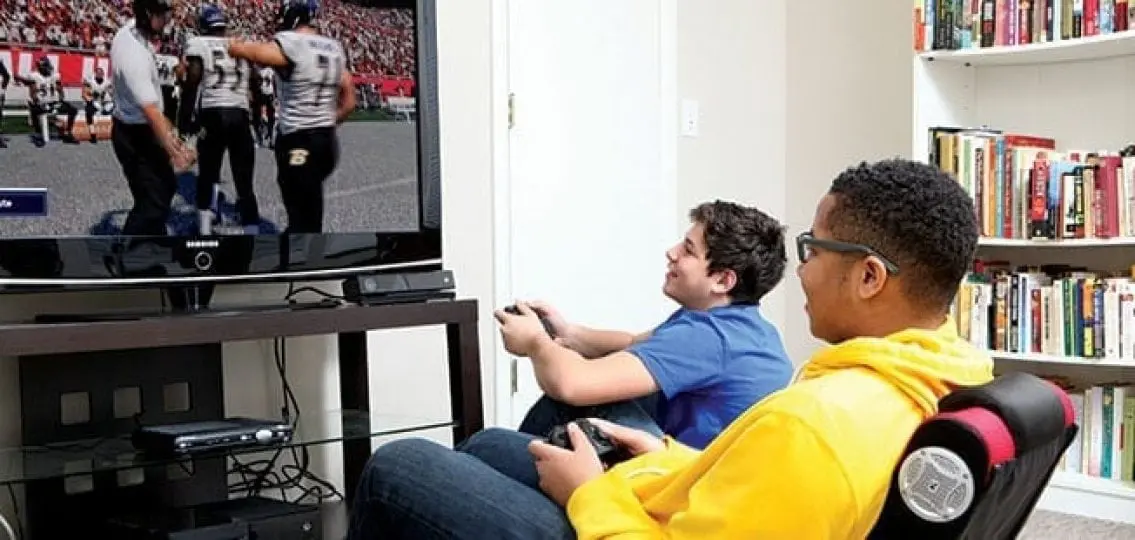If you have a teenage boy in your house, then you also have computer games in your house. The amount of time your teen son spends gaming has probably caused you no small amount of angst and irritation. There are so many better things he could be doing, right? Homework, exercise, part-time job, taking out the garbage, perhaps reading a book for pleasure. And nagging him to turn off the computer games and do his homework is a fight neither one of you likes to have every day.
The Unexpected Positive Effects Of Video Games
But what if there were positive effects of video games and those games were actually improving math grades and test scores? What if video games have earned an unfair reputation as time-wasting corrupters of youth, but instead boost their problem-solving and critical-thinking abilities? Are there positive effects of video games or is this too good to be true?
A recent study has found that teens who were regular gamers scored higher than average in math, reading, and science on standardized exams. The study, published in the International Journal of Communication, looked at the online activities and test scores of 12,000 Australian 15-year-olds. It evaluated the 2012 results from the Program for International Student Assessment exams. The test measures the student’s knowledge and application of skills in the three subject areas. The study also looked at internet use.
Math And Video Games
According to the study, teens who spend their online time gaming score better in math and science than those who spend their time on social media. Students who spent higher than average time on social networking sites such as Instagram or Twitter each day had below-average performance on the tests. Students who spent more than the usual time gaming achieved at levels above the average.
“Children who regularly use online social networks, such as Facebook, tend to obtain lower scores in math, reading, and science than students who never or hardly ever use these sites,” the study found. For example, a student who uses social networks daily scores 20 points lower in math than a student who never uses social media (the average math score in Australia for 2012 was 504 points). Teens who daily interacted on Facebook or Twitter more than others scored 4% worse than average in math. Students who play online games almost every day score 15 points above the average in math and 17 points above the average in science. And the more students used social media, the worse their scores tended to be.
Video Games And Test Scores
Yes, correlation isn’t exactly causation. Yet experts say that the finding that gamers get higher math and science scores can be explained. Some teens looking for intellectual stimulation may not find it on social media. They may, however, find it with video games, especially those requiring strategic, tactical and logistic planning.
“This may be because many online games require players to solve puzzles that, in turn, require some understanding of these three subjects,” concluded Alberto Posso, author of the study and an associate professor at the Royal Melbourne Institute of Technology’s School of Economics, Finance and Marketing. At the same time, Posso wrote, “it could be argued that people who are good at math and reading also enjoy games that allow them to employ (or even sharpen) these skills.” It could just be that “kids who are sharp are looking for a challenge. They don’t find it on social media, and maybe they do find it on board games and video games,” Posso concluded.
At some point, though, the positive correlation begins to wear off. Students who play almost every day do better than those who play every single day. They also do better than those who play just once a week.
Video Games vs Social Media
There are other positive effects of video games. Spending time gaming is probably better for your teen’s mental health than social media. Teens who spend more than two hours a day on sites like Twitter or Facebook are more likely to have poor mental health. This may include psychological distress and suicidal thoughts. Researchers from Ottawa Public Health surveyed students in 7th-12th grade about their use of social media and psychological well-being. Teens who spent at least two hours on social media sites were more likely to experience symptoms of anxiety or depression.
Similarly, researchers at the University of Missouri found that Facebook use can lead to symptoms of depression if the social networking site triggers feelings of envy among its users. Teens who engage in “surveillance use” of Facebook to see how their friends are doing compared with their own lives. These teens can experience feelings of envy. These feelings can, in turn, lead to those users experiencing symptoms of depression.
Suddenly your son’s weekend spent on “Age of Empires” or “World of Warcraft” doesn’t seem quite so bad, does it? He’s not wasting time—he’s boosting his math and science scores! Everyone’s a winner. Now if he would just remember to take out that garbage.



